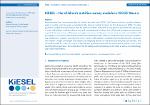KiESEL – the children’s nutrition survey module in KiGGS Wave 2
Golsong, Nadine
Nowak, Nicole
Schweter, Antje
Lindtner, Oliver
Representative food consumption data for children are collected in KiESEL, the German nutrition survey for children aged 6 months up to five years conducted by the German Federal Institute for Risk Assessment (BfR). The data gained will update the consumption data for German children and will fill a data gap that existed for the age group of 5-year-old children. It will provide an actual and comprehensive data basis that will be used for exposure assessment, as part of risk assessment of Germany’s youngest consumers. In the years 2014 to 2017, around 1,000 children will participate in the context of the KiESEL module of the German Health Interview and Examination Survey for Children and Adolescents (KiGGS). During home visits, survey staff conducts a questionnaire-based interview, measures the children’s height and weight and explains the weighing records for the family and the child care workers. The data will be used for risk assessments of the BfR and provided to national and international partners such as the World Health Organization. This article describes the background and objectives of the study as well as its methodology and survey instruments.

